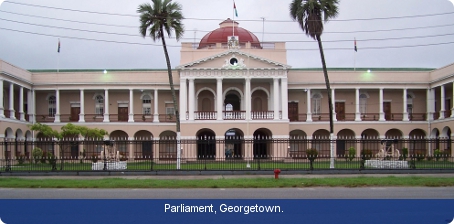Government
- Overview
- History

Guyana is a republic, divided into administrative regions, with an executive president. Legislative power in Guyana resides in a unicameral legislature, the National Assembly, with 65 members directly elected by proportional representation. 40 of these are elected at a national level, while the other 25 are elected at a regional level. The president may dissolve the assembly and call elections at any time but no later than five years from its first sitting.
Authority is exercised by the president who appoints and supervises the prime minister (head of government) and other ministers. The president is not directly elected. Instead, parties presenting candidates for the assembly nominate a leader who will become president if that party achieves the highest number of votes. Although only the prime minister is required to be a member of the assembly, in practice most other ministers are members.
Guyana is divided into ten regions each headed by a chairman who presides over a regional democratic council.
The judicial system is based on English Common Law with elements of Roman-Dutch Law, and is presided over by the Supreme Court. The most serious cases appear before the High Court, others before the magistrates’ courts. Appeals are to the High Court, then the Court of Appeal, and finally to the Caribbean Court of the Justice in Port of Spain, Trinidad and Tobago, which in 2005 succeeded the United Kingdom’s Privy Council as Guyana’s final court of appeal.

Originally, the South American country of Guyana was inhabited by semi-nomadic Amerindian tribes. Colonial competition for Guyana began at the end of the fifteenth century. By the seventeenth century it was a Dutch colony but by 1815 it had come under the sway of the British. The abolition of slavery led to the importation of indentured labour from India to work the sugar plantations. Guyana achieved independence from the United Kingdom in 1966.
The 1953 general elections were won by the People’s Progressive Party (PPP), led by Dr Cheddi Jagan. The PPP had a large East Indian following, whereas the People’s National Congress (PNC), a breakaway party formed in 1957, had its roots among Guyanese of African origin.
A constitutional conference in 1960 provided for a new constitution with full internal self-government. In the 1961 elections the PPP again won a majority. Proportional representation was introduced a few years later.
The PNC led by Forbes Burnham was returned in the 1968 elections; the PNC remained in power until 1992. In the 1992 elections the PPP-Civic coalition won a majority and Jagan became president.
In the 2011 general elections PPP-Civic won 32 seats, one seat short of a parliamentary majority. Donald Ramotar of the PPP became president.



